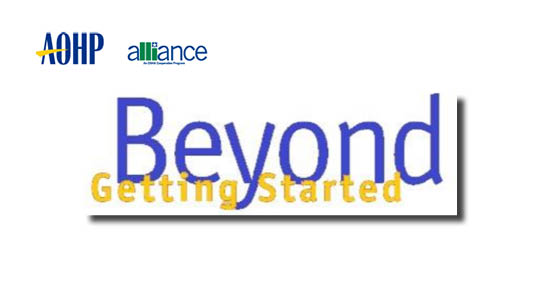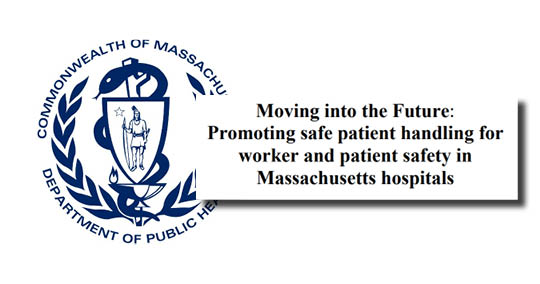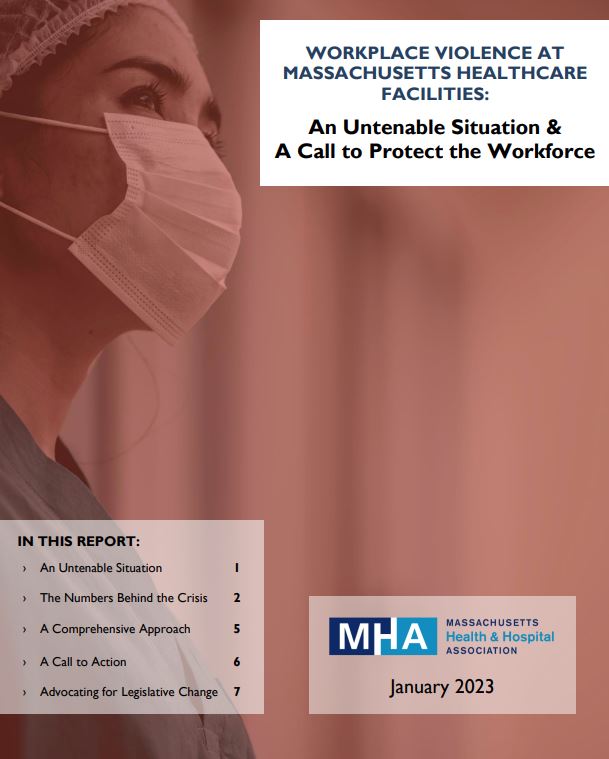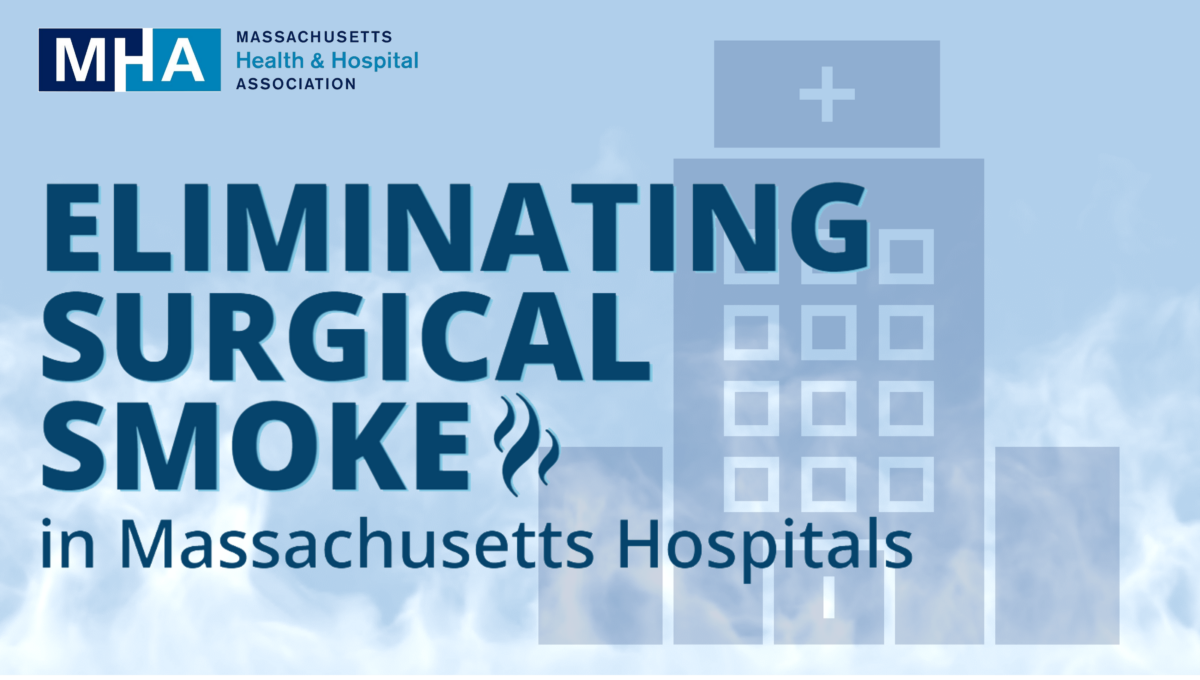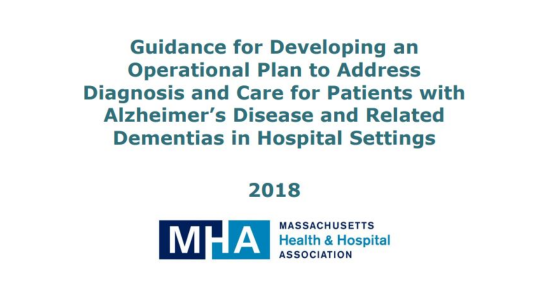Beyond Getting Started: A Resource Guide for Implementing a Safe Patient Handling Program in the Acute Care Setting
This resource guide addresses patient handling with the goal of providing the necessary tools for the occupational health professional (OHP) to implement a safe patient handling program. There is a great deal of emerging information, and this resource guide contributes toward the consolidation of that information.
Author: admin
Occupational Health Surveillance Program, Massachusetts Department of Public Health
Moving into the Future: Promoting safe patient handling for worker and patient safety in Massachusetts hospitals
The risks of injury to health care workers associated with the manual handling of patients are widely recognized. Findings from the survey of Massachusetts hospitals included in this report indicate that most Massachusetts hospitals have already taken steps to improve patient handling practices to protect workers and patients, but that more remains to be done.
Patient Safety Awareness Week: March 12-18
Includes three free webinars hosted by IHI.
2023’s Patient Safety Awareness Week, led by the Institute for Healthcare Improvement (from IHI), is March 12-18!
From IHI:
Patient Safety Awareness Week is an annual recognition event intended to encourage everyone to learn more about health care safety. During this week, IHI seeks to advance important discussions locally and globally, and inspire action to improve the safety of the health care system — for patients and the workforce.
Patient Safety Awareness Week serves as a dedicated time and platform for growing awareness about patient safety and recognizing the work already being done.
Offerings include three free webinars:
- March 14 | 12-1pm ET: Back to Our Purpose: The Reboot of Safety
- March 15 | 3-4pm ET: Partnering with Patients to Improve Diagnostic Safety
- March 6 | 11am-12pm ET: Incorporating CPPS™ Certification into Academic Curriculum
Find out more from IHI here.
MHA Members Issue a United Call to Action on Violence in Healthcare Facilities
Principles will be adapted within each organization’s Codes of Conduct.
Healthcare organizations across the commonwealth will adopt a common set of principles within their Patient and Family Codes of Conduct as part of a unified call to action to protect healthcare workers and the patients in their care. The United Code of Conduct is part of a new Massachusetts Health & Hospital Association (MHA) report: “Workplace Violence at Massachusetts Healthcare Facilities: An Untenable Situation & A Call to Protect the Workforce,” which sheds light on the escalation of violent incidents in Massachusetts healthcare facilities and the extensive measures being taken to prevent them.
Last week, the MHA Board of Trustees endorsed these United Code of Conduct Principles. They include measures to promote a safe and respectful environment, examples of what potential violations look like, proposed consequences for violations, and recommendations for maintaining the principles long-term. The effort is a part of MHA’s larger workforce initiative to support and grow the commonwealth’s base of talented healthcare professionals.
“Healthcare workers are under more pressure than at any time in history, and violence will never be a part of their job description. Hospital and health system leaders recognize this, and are doing everything in their power to mitigate unacceptable behavior in their facilities. But they cannot do it without the help and support of community members,” said Steve Walsh, President & CEO of MHA. “This effort is about taking a stand for the wellbeing of caregivers in a way that every one of us can control.”
“These principles set firm, direct expectations among everyone who enters a healthcare facility in Massachusetts – no matter where that might be,” said Therese Hudson-Jinks, MSN, RN, NEA-BC, Chief Nursing Officer, Chief Experience Office, and Senior Vice President of Patient Care Services at Tufts Medical Center. “Healthcare facilities are a place of refuge. Great patient care is only possible when all our employees — from nurses and physicians to security personnel and administrative staff – feel safe and secure.”
Over the past three years, MHA has conducted a monthly survey of Massachusetts hospitals to track the frequency, location, and types of violence committed on their campuses. The 56 responding acute and post-acute hospitals across the commonwealth provided data revealing that every 38 minutes in a Massachusetts healthcare facility there is a case of physical assault, verbal abuse, or threats made against someone – most often a clinician or staff member. Nurses report the most (38%) incidents of workplace violence, followed by security personnel (27%), and other clinical staff (19%).
The new report includes data on abusive incidents, as well as the solutions MHA members are championing to protect healthcare professionals. Violence prevention has been a long-standing priority for Massachusetts hospitals and health systems.
MHA has again filed comprehensive violence prevention legislation at the State House as the new legislative session begins; the association also serves as a forum for leaders to share knowledge, establish best practices, and construct reforms around issues of worker safety. This work is led by the MHA’s Healthcare Safety and Violence Prevention Workgroup, which is composed of more than 70 experts in security, nursing, human resources, and more.
To learn more about the United Code of Conduct and the workplace violence crisis, please reference “Workplace Violence at Massachusetts Healthcare Facilities: An Untenable Situation & A Call to Protect the Workforce.”
WEBINAR | Care of Infants with RSV in the NICU
On December 19, 2022, MHA hosted this webinar with four key objectives:
- Discuss nursing-care-related issues for non-traditional NICU patients;
- Identify non-traditional patients that may benefit from NICU admission;
- Discuss respiratory-support-related interventions for non-traditional
NICU admissions; and - Assess how a non-traditional NICU admission protocol might be
implemented in your health system.
WATCH THE WEBINAR HERE:
Presentation slides are available below:
WEBINAR | Eliminating Surgical Smoke
Massachusetts hospitals have committed to eliminating surgical smoke from their facilities by 2024. This preliminary webinar is intended to help provide facilities with tools, resources, and case studies to fulfill the mission.
WATCH THE WEBINAR HERE:
Presentation slides are available below:
WEBINAR | High Flow Nasal Cannula (HFNC) in Bronchiolitis: Managing Care Outside the ICU
Given the recent surge in cases of respiratory illness in children, MHA and the Department of Public Health hosted a webinar — High Flow Nasal Cannula (HFNC) in Bronchiolitis: Managing Care Outside the ICU — on November 2, 2022.
The webinar is tailored to clinicians who are managing patients with bronchiolitis on HFNC outside the ICU – in both community hospitals and sites where there may be a pediatric ICU that is currently at capacity. Please feel free to invite other involved staff members.
The webinar:
- Summarized the physiologic mechanism for HFNC in bronchiolitis;
- Identified patients with bronchiolitis who may benefit from HFNC;
- Discussed a weight-based approach for initiation, escalation, and weaning of HFNC; and
- Assessed how a pathway for management of HFNC in bronchiolitis might be implemented in your health system
WATCH THE WEBINAR HERE:
Presentation slides are available below:
Mass. Hospitals Commit: Eliminating Surgical Smoke by 2024
The MHA Board of Trustees is calling on all Massachusetts hospitals to eliminate surgical smoke from their facilities by 2024 through the implementation of a nationally recognized smoke evacuation program. Surgical smoke is produced by the destruction of tissue by use of lasers or electrosurgical devices. Research studies confirm that surgical smoke can contain toxic gases and vapors such as benzene, hydrogen cyanide, formaldehyde, and bioaerosols, as well dead and live material, including blood tissue particles, bacteria, and viruses.
MHA’s Clinical Issues Advisory Council (CIAC) – the group consisting of clinical leaders from across the state that advises the board – created the MHA Workgroup on Surgical Smoke Evacuation, which then developed and fielded surveys on the issue. A 2021 MHA survey found that of the 55 unique responders, 40% always use surgical smoke evacuators and 61% have a smoke evaluation policy in place.
“Massachusetts hospitals continue to improve their efforts to eliminate surgical smoke, but CIAC and now the MHA Board want to jumpstart those efforts,” said Michael Gustafson, M.D., president of UMass Memorial Medical Center, chair of CIAC, and a member of the MHA Board. “The necessary goal is to protect all members of the OR team – surgeons, nurses, allied healthcare staff, and, of course, patients – from hazard. It’s part of the culture of safety that all hospitals strive for.”
MHA sent a commitment letter to each hospital asking them to educate senior leadership on the long-term hazards of exposure to surgical smoke, implement a policy and invest in the devices to eliminate surgical smoke, and report back to MHA on their progress. Currently seven facilities in Massachusetts have received the Association of periOperative Registered Nurses (AORN) “Go Clear Award,” one of the nationally recognized programs hospitals can participate in to meet the MHA Board’s 2024 target.
Surgeons, whose hands hold the lasers and whose vision is affected by both smoke and the evacuation devices, are key to the success of the initiative. Dr. John J. Mazzucco, a general surgeon at Holyoke Medical Center, has been a leading advocate for the elimination of surgical smoke throughout the MHA process. “There is definitely a requirement to adapt to the new technology introduced into the OR,” he says. “But the benefits to the care team in terms of protecting them from the proven bioaerosols, as well dead and live material, including blood tissue particles, bacteria, and viruses far outweighs the need for the learning curve surgeons must undertake.”
Baystate Medical Center and Baystate Franklin Medical Center are among the Massachusetts hospitals that already have received AORN’s Go Clear Gold Award. “Because of how surgeries are conducted, patients are exposed to surgical smoke usually for short periods of time.” said Patricia Samra, R.N., VP of HR and Total Rewards at Baystate Health. “But studies have shown that perioperative nurses report twice as many respiratory issues as compared to the general population, and the hazard to those in the OR day in and out is of great concern. Eliminating surgical smoke not only makes sense from a clinical viewpoint, but it shows our staff – who work in extraordinarily stressful situations – that we place great importance on their health and wellbeing.”
MHA will be conducting education programs and sharing best practices in the coming months to assist hospitals reach the goal of eliminating surgical smoke by 2024.
Resources for Massachusetts hospitals will be compiled on this page.
Caring for Patients with Alzheimer’s Disease & Related Dementias
In June 2017, the state’s Alzheimer’s and Related Dementias Acute Care Advisory Committee issued its final report with a goal of outlining strategies to provide optimal care to persons with dementia in acute care settings.
Following the issuance of the state report, MHA convened its own workgroup consisting of clinical and operational experts from its membership, as well as representatives of the Alzheimer’s Association. The MHA workgroup developed guidance that would assist hospitals with implementing care and management practices for patients with Alzheimer’s and related dementias based on the report from the statewide advisory committee.
During this time, Massachusetts enacted a new law – Chapter 220 of the Acts of 2018, effective November 7, 2018 – that would require all hospitals licensed by DPH to implement by October 1, 2021, an operational plan for the recognition and management of patients with dementia or delirium in acute care settings. The state is now mandating that physician, physician assistant, registered nurse, and practical nurse license renewal include a one-time completion of a course of training and education on the diagnosis, treatment, and care of patients with cognitive impairments.
The goal of this document – Guidance for Developing an Operational Plan to Address Diagnosis and Care for Patients with Alzheimer’s Disease and Related Dementias in Hospital Settings – is to provide guidance for hospitals on the clinical and operational practices that should be incorporated into a hospital’s operational plan to meet the new law, which is based on the statewide advisory committee report.
New National Academies Report:
Mechanisms for Organizational Behavior Change
The National Academies has released a new report, Mechanisms for Organizational Behavior Change to Address the Needs of People Living with Alzheimer’s Disease and Related Dementias.
The report is available here, and more detail form the National Academies is below:
Patients diagnosed with Alzheimer’s disease and related dementias (ADRD) rely on family members, their community, and the health care system for progressively increasing support over the course of their disease. These people receive care through a frequently siloed health care system across hospitals, nursing homes, ambulatory care settings, and long-term care settings, as well as community- and home-based care. As the number of people living with a diagnosis of ADRD continues to grow, so does the need to provide better support for these people and their caregivers. The National Institute on Aging (NIA) Division of Behavioral and Social Research suggests that organizational behavior change will be needed for health care systems to integrate all of the services and supports required to provide high-quality care for people with ADRD.
NIA sponsored a workshop hosted by the National Academies of Sciences, Engineering, and Medicine to explore mechanisms to improve the quality of care for people living with ADRD and the potential of innovative payment models to incentivize health care systems to make the necessary systemic changes. The workshop convened a diverse array of experts in fields including nursing, geriatrics, health care economics, health care services research, quality measurement, social work, medical ethics, law, health care finance, and health care policy. This publication summarizes the presentation and discussion of the workshop.

